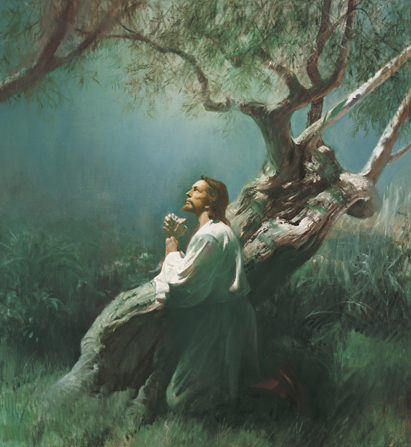Who
Is This King Of Glory
Talk
given by Peter Barrow
March
31
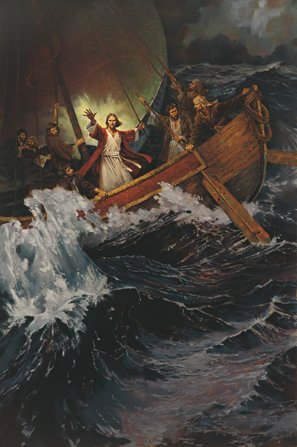 I've
chosen for the title of my talk a phrase that comes from Psalm 24:8, "Who
is this King of Glory?" As I've studied the life of and teachings of Jesus
Christ i find myself becoming more and more intrigued by this Jesus of
Nazareth. I am drawn to Him and hope that you and i both find ourselves
desiring to know "Who is this king of
glory?" Or we may echo the disciples of Jesus when they asked
themselves in wonder, "What manner of man is
this, that even the wind and the sea obey him?" (New Testament,
Mark, Chapter 4) I wish to share some scriptures and thoughts I have pertaining
thereto that I believe illustrate just how unique among men is Jesus Christ.
I've
chosen for the title of my talk a phrase that comes from Psalm 24:8, "Who
is this King of Glory?" As I've studied the life of and teachings of Jesus
Christ i find myself becoming more and more intrigued by this Jesus of
Nazareth. I am drawn to Him and hope that you and i both find ourselves
desiring to know "Who is this king of
glory?" Or we may echo the disciples of Jesus when they asked
themselves in wonder, "What manner of man is
this, that even the wind and the sea obey him?" (New Testament,
Mark, Chapter 4) I wish to share some scriptures and thoughts I have pertaining
thereto that I believe illustrate just how unique among men is Jesus Christ.
The first example comes
from the Grand Council in heaven where the
Plan of Salvation was laid before us all. After explaining the purpose in
sending his children to earth, God the Father asked "Whom shall I send?" Jesus Christ assessed the
situation and asked himself "How can I make
this situation better for not only myself but for all those around me?"
In other words, if Jesus Christ were a member of a singles ward, he wouldn't
say "this ward isn't satisfying my needs." Rather, he would ask
himself, "What can I do to satisfy the needs of those around me?" Satan on the other hand, asked "What's in it for me?"
He wanted to make sure the earthly experience was good for him. "How can
everyone else make my experience better?" he asked.
Becoming like the savior
and emulating his sacrifice that we celebrate today means overcoming selfishness.
Even during the hardest
moment of His life, he was more concerned about others. Jesus couldn't help but go about doing good and putting others'
needs before His own.
When Jesus retired to the
Garden of Gethsemane on his own, Peter James and John followed Jesus further
into the garden than the other apostles. Jesus told them to wait for him. Part
way through the great intercessory prayer, Jesus came back to check on the
Apostles. He found them asleep. The first time this happened, Jesus told them
to watch and pray before He again returned to his own prayer. Mark records,
"And again he went away, and prayed, and spake
the same words. And when he returned, he found them asleep again, (for their
eyes were heavy,) neither wist they what to answer him. And he cometh the third
time, and saith unto them, Sleep on now, and take your rest: it is enough, the
hour is come; behold, the Son of man is betrayed into the hands of sinners."
(New Testament, Mark, Chapter 14).
Jesus was suffering greater than any man had
known and his closest friends couldn't stay awake for it. How does Jesus
respond? He had mercy upon them and let them sleep!
He knew that these apostles were very much like innocent children in their
understanding of what was happening that night.Who is this King of Glory!
Immediately after, Judas arrives on the scene with a multitude of armed men.
I sometimes wonder if Judas encouraged those men to arm themselves, he knowing
better than any of them who they were about to apprehend ("You guys are
going to need more swords.") When they attempted to take Jesus, Peter
(bless his heart) pulls a Van Gogh and cuts off the
ear of one of the members of the band. How does Jesus respond? He heals the very man that was there to harm Jesus.
I've wondered about this and imagine that Jesus almost couldn't restrain
himself from healing that man. I believe that when Jesus saw this man
suffering, Jesus knew that he had the power and the opportunity to help this
man and did so. Jesus knew that the cause these men were committed to paled in
comparison to what He was focused on. But I ask myself, "What manner of
man is this, that in His moment of greatest need, he heals the very men that
intend to harm him?"
My next example comes from John 14:6. Jesus Christ is explaining to His
apostles that He is preparing a place for them in heaven. He says to them,
"you know where I am going and you know the
way."
Thomas
responds, "but we don't know where you are going and how can we know the
way?"
Jesus says, "I am the way, the truth, and the life: no man cometh unto
the Father, but by me."
This scripture has been on
my mind for the last three or four years. In my opinion, this scripture alone
sets Jesus Christ apart from any other human being that has ever inhabited the
face of the earth. How can one individual BE the
way, BE the truth, BE the life?
Any other major world
religious leader has said or can only say that they
know the way, or that they have found the truth or that they teach the way that
leads to eternal life. But here
we have a carpenter from Nazareth, the son of Joseph, proclaiming that He is
the very embodiment of truth, that not only does he know the way, but that he
IS the way.
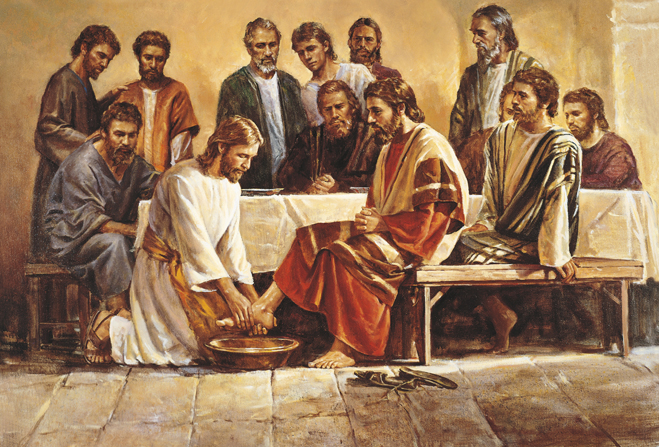 Furthermore, He doesn't
simply say that he represents or is truth, but that he is exclusively THE
truth, THE way, THE life. Truth is such an important idea to our Savior that it
is one of only three titles that the Savior assigns to himself here. The other
two titles make sense easily enough considering Christ's role as our Savior.
But what about Truth?
Furthermore, He doesn't
simply say that he represents or is truth, but that he is exclusively THE
truth, THE way, THE life. Truth is such an important idea to our Savior that it
is one of only three titles that the Savior assigns to himself here. The other
two titles make sense easily enough considering Christ's role as our Savior.
But what about Truth?
When Joseph Smith prayed to
know the truth, he was confused by the many religions claiming that they alone
knew the way to salvation. Little did Joseph know that none of them in fact
knew the whole truth. Today we face quite the
opposite. Instead of people crying, "Lo here," and "Lo
there," society is saying "Lo anywhere." This makes the
above statement by Jesus Christ all the more pertinent to our time. He, along
with the Book of Mormon and the prophets and apostles testifies that
"there shall be no other name given nor any other way nor means whereby
salvation can come unto the children of men, only in and through the name of
Christ, the Lord Omnipotent." (Book of Mormon, Mosiah, Chapter 3)
My next example shows that Christ was the perfect Teacher. He was focused on
the individual. I can picture him walking with His apostles. He turns to them
and suddenly begins a teaching moment. "Whom
do men say that I the Son of Man am?"
"And
they said, some say that thou art John the Baptist; some, Elias; and others
Jeremias, or one of the prophets.
"He
saith unto them, But whom say ye that I am?" In that moment, Christ was more concerned about Peter's testimony than he
he was about popular opinion.
"And Simon Peter
answered and said, Thou art the Christ, the Son of the Living God."
Let me preface my next
example with a quote from Elder Dallin H. Oaks.
"The Apostle Paul
taught that the Lord’s teachings and teachers were given that we may all attain
“the measure of the stature of the fulness of Christ” (Eph. 4:13). This process
requires far more than acquiring knowledge. It is not even enough for us to be
convinced of the gospel; we must act and think so that we are converted by it. In contrast to the institutions of the world, which teach
us to know something, the gospel of Jesus Christ challenges us to become
something. (2000 October General Conference, The Challenge to Become,
Sat. Afternoon Session - Dallin H. Oaks)"
The Atonement
of Jesus Christ allows us to BECOME celestial beings, not just inherit a
celestial world. The celestial world is such only because the
Beings that reside there, namely God the Father and Jesus Christ are themselves
celestial beings. They ARE what we are supposed to
BECOME.
With this idea of BECOMING
in mind, please consider the following. When Jesus Christ introduced himself as
Jehovah to Moses in the burning bush, He refers to
himself as the Great I AM. "Am."
Why does Christ refer to Himself as I Am. In the English language, AM is a form
of the verb "become." I submit that it is because he has been, is, and always will BE what God intends all
of us to be. In other words, he IS. Or, in the first person, "I AM."
In fact, think of this
scripture from 3 Nephi 27: "Therefore, what
manner of men ought ye to be? Verily I say unto you, even as I am." (Book of
Mormon, 3 Nephi, Chapter 27)
Let me close with two
statements that stood out to me when I read the Easter story contained in the
four gospels.
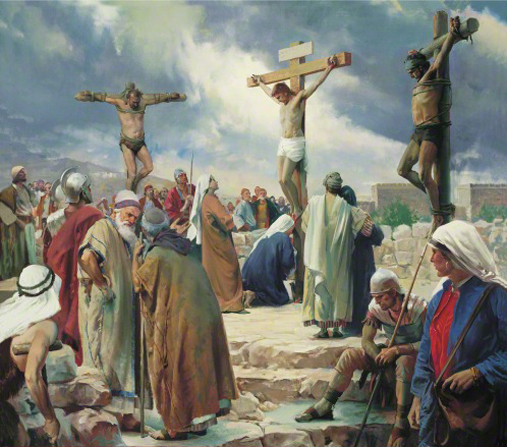 Jesus Christ is hung on the
cross and Pontus Pilate writes a title to put on the
cross above Jesus. He writes, "King of
the Jews." Then the chief priests say, "Write not, The King of the Jews; but that he said, I am
King of the Jews." (New Testament, John, Chapter 19)
Jesus Christ is hung on the
cross and Pontus Pilate writes a title to put on the
cross above Jesus. He writes, "King of
the Jews." Then the chief priests say, "Write not, The King of the Jews; but that he said, I am
King of the Jews." (New Testament, John, Chapter 19)
Sound familiar? It should.
We live in a day and age when the world says the exact same thing when
discussing Jesus. "He wasn't King of the
Jews. He just said He was King of the
Jews." Or "He wasn't our Savior, he just said he was our Savior."
And finally when Pontius
Pilate presents Jesus to the Jews he cries "Behold
your King!" the multitude responds, "Away with him, away with
him, crucify him." Pilate saith unto them, Shall I crucify your King? The
chief priests answered, We have no king but Cæsar.
(New Testament, John, Chapter 19)
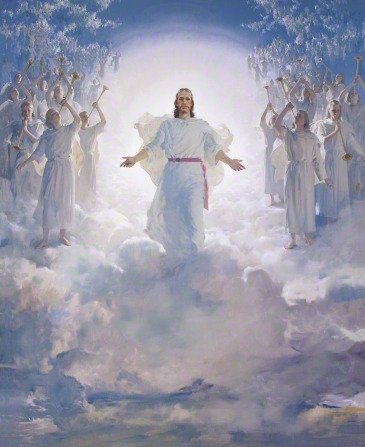 "We have no king but
Caesar." The chief Priests and the Jews in general during the time of
Jesus Christ absolutely detested Caesar. To them he represented everything that
their Old Testament forefathers had tried so hard to escape and be separate
from, what with his pagan beliefs and many false gods. I pray that you and I
aren't found saying "we have no king but Caesar," because I testify that we have a King.
"We have no king but
Caesar." The chief Priests and the Jews in general during the time of
Jesus Christ absolutely detested Caesar. To them he represented everything that
their Old Testament forefathers had tried so hard to escape and be separate
from, what with his pagan beliefs and many false gods. I pray that you and I
aren't found saying "we have no king but Caesar," because I testify that we have a King.